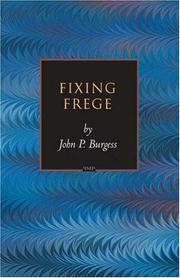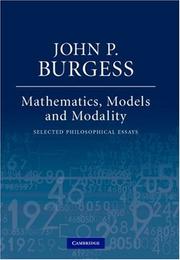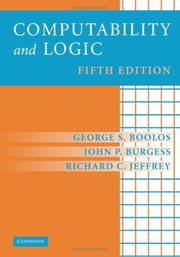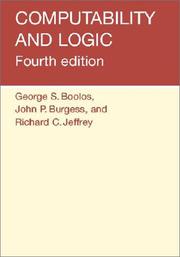| Listing 1 - 9 of 9 |
Sort by
|

ISBN: 0691122318 9780691122311 0691187061 Year: 2005 Publisher: Princeton Princeton university press
Abstract | Keywords | Export | Availability | Bookmark
 Loading...
Loading...Choose an application
- Reference Manager
- EndNote
- RefWorks (Direct export to RefWorks)
Logic, Symbolic and mathematical. --- Frege, Gottlob --- Logic, Symbolic and mathematical --- Algebra of logic --- Logic, Universal --- Mathematical logic --- Symbolic and mathematical logic --- Symbolic logic --- Mathematics --- Algebra, Abstract --- Metamathematics --- Set theory --- Syllogism --- Frege, Gottlob, --- Frege, G. --- Fu-lei-ko, --- Frege, Friedrich Gottlob, --- פרגה, גוטלוב, --- Frege, Friedrich Ludwig Gottlob,

ISBN: 0521880343 9780521880343 9780511487347 9780521189675 9780511388200 0511388209 0511387210 9780511387210 9780511384356 0511384351 0511487347 0521189675 1107184290 1281254878 9786611254872 0511386184 0511382545 Year: 2008 Publisher: Cambridge : Cambridge University Press,
Abstract | Keywords | Export | Availability | Bookmark
 Loading...
Loading...Choose an application
- Reference Manager
- EndNote
- RefWorks (Direct export to RefWorks)
John Burgess is the author of a rich and creative body of work which seeks to defend classical logic and mathematics through counter-criticism of their nominalist, intuitionist, relevantist, and other critics. This selection of his essays, which spans twenty-five years, addresses key topics including nominalism, neo-logicism, intuitionism, modal logic, analyticity, and translation. An introduction sets the essays in context and offers a retrospective appraisal of their aims. The volume will be of interest to a wide range of readers across philosophy of mathematics, logic, and philosophy of language.
Logic, Symbolic and mathematical. --- Mathematics --- Philosophy. --- Algebra of logic --- Logic, Universal --- Mathematical logic --- Symbolic and mathematical logic --- Symbolic logic --- Algebra, Abstract --- Metamathematics --- Set theory --- Syllogism --- Logic of mathematics --- Mathematics, Logic of --- Arts and Humanities --- Philosophy

ISBN: 1280453389 0195354958 0585320780 9780585320786 9781280453380 0195110986 9780195110982 0197738931 Year: 1997 Publisher: New York : Oxford University Press,
Abstract | Keywords | Export | Availability | Bookmark
 Loading...
Loading...Choose an application
- Reference Manager
- EndNote
- RefWorks (Direct export to RefWorks)
Burgess explores how dissident groups in Eastern Europe drew on church symbols and language to develop a popular alternative theology and how the theological tension between the church and the dissidents provided impulses for political democratisation.
Church and state --- Communism and Christianity --- Democracy --- Christianity and democracy --- Christianity and communism --- Christianity --- Religious aspects --- Christianity. --- Germany (East) --- Church history.
Book
ISBN: 1782689494 128345808X 9786613458087 1400830494 9781400830497 9780691137896 0691137897 9780691156330 0691156336 9781782689492 9781283458085 6613458082 Year: 2009 Publisher: Princeton : Princeton University Press,
Abstract | Keywords | Export | Availability | Bookmark
 Loading...
Loading...Choose an application
- Reference Manager
- EndNote
- RefWorks (Direct export to RefWorks)
Philosophical Logic is a clear and concise critical survey of nonclassical logics of philosophical interest written by one of the world's leading authorities on the subject. After giving an overview of classical logic, John Burgess introduces five central branches of nonclassical logic (temporal, modal, conditional, relevantistic, and intuitionistic), focusing on the sometimes problematic relationship between formal apparatus and intuitive motivation. Requiring minimal background and arranged to make the more technical material optional, the book offers a choice between an overview and in-depth study, and it balances the philosophical and technical aspects of the subject. The book emphasizes the relationship between models and the traditional goal of logic, the evaluation of arguments, and critically examines apparatus and assumptions that often are taken for granted. Philosophical Logic provides an unusually thorough treatment of conditional logic, unifying probabilistic and model-theoretic approaches. It underscores the variety of approaches that have been taken to relevantistic and related logics, and it stresses the problem of connecting formal systems to the motivating ideas behind intuitionistic mathematics. Each chapter ends with a brief guide to further reading. Philosophical Logic addresses students new to logic, philosophers working in other areas, and specialists in logic, providing both a sophisticated introduction and a new synthesis.
Logic. --- Argumentation --- Deduction (Logic) --- Deductive logic --- Dialectic (Logic) --- Logic, Deductive --- Intellect --- Philosophy --- Psychology --- Science --- Reasoning --- Thought and thinking --- Methodology
Book
ISBN: 0300227639 9780300227635 9780300222241 0300222246 Year: 2017 Publisher: New Haven ; London : Yale University Press,
Abstract | Keywords | Export | Availability | Bookmark
 Loading...
Loading...Choose an application
- Reference Manager
- EndNote
- RefWorks (Direct export to RefWorks)
A fascinating, vivid, and on-the-ground account of Russian Orthodoxy’s resurgence A bold experiment is taking place in Russia. After a century of being scarred by militant, atheistic communism, the Orthodox Church has become Russia’s largest and most significant nongovernmental organization. As it has returned to life, it has pursued a vision of reclaiming Holy Rus’: that historical yet mythical homeland of the eastern Slavic peoples; a foretaste of the perfect justice, peace, harmony, and beauty for which religious believers long; and the glimpse of heaven on earth that persuaded Prince Vladimir to accept Orthodox baptism in Crimea in A.D. 988. Through groundbreaking initiatives in religious education, social ministry, historical commemoration, and parish life, the Orthodox Church is seeking to shape a new, post-communist national identity for Russia. In this eye-opening and evocative book, John Burgess examines Russian Orthodoxy’s resurgence from a grassroots level, providing Western readers with an enlightening, inside look at the new Russia.
National characteristics, Russian --- Christianity and culture --- History --- Russkai︠a︡ pravoslavnai︠a︡ t︠s︡erkovʹ --- Influence. --- Russia (Federation) --- Church history
Book
ISBN: 1782689524 1283033526 9786613033529 140083869X 9781400838691 9780691144016 069114401X 9781782689522 9781283033527 Year: 2010 Publisher: Princeton [N.J.] : Princeton University Press,
Abstract | Keywords | Export | Availability | Bookmark
 Loading...
Loading...Choose an application
- Reference Manager
- EndNote
- RefWorks (Direct export to RefWorks)
This is a concise introduction to current philosophical debates about truth. Combining philosophical and technical material, the book is organized around, but not limited to, the view known as deflationism. In clear language, Burgess and Burgess cover a wide range of issues, including the nature of truth, the status of truth-value gaps, the relationship between truth and meaning, relativism and pluralism about truth, and semantic paradoxes from Alfred Tarski to Saul Kripke and beyond. The book provides a rich picture of contemporary philosophical theorizing about truth, one that will be essential reading for philosophy students as well as philosophers specializing in other areas.
Truth. --- Conviction --- Belief and doubt --- Philosophy --- Skepticism --- Certainty --- Necessity (Philosophy) --- Pragmatism --- Alfred Tarski. --- Aristotle. --- Davidsonianism. --- Dummettianism. --- Frank P. Ramsey. --- Saul Kripke. --- W. V. Quine. --- antirealism. --- axiomatic theories. --- communication. --- contextualist solutions. --- correspondence theories. --- defeatism. --- deflationism. --- denial strategy. --- deviance strategy. --- direct definition. --- dis"ationalism. --- disqualification strategy. --- doublespeak strategy. --- equivalence principle. --- formal language. --- holism. --- inconsistency theories. --- indeterminacy. --- inflationism. --- logical solutions. --- mathematics. --- meaning. --- metalanguage. --- minimum fixed point. --- model theory. --- normativity. --- object language. --- paraconsistency. --- paradoxes. --- physicalism. --- pluralism. --- presupposition. --- realism. --- redundancy theory. --- reference. --- relativism. --- relativity. --- revenge. --- revision theories. --- self-reference. --- semantic truth. --- sentences. --- slogans. --- transfinite construction. --- truth predicate. --- truth-conditional semantics. --- truth. --- truthmaker theories. --- ungroundedness. --- utility. --- vagueness. --- value. --- verification-conditional semantics.

ISBN: 9780521877527 0521877520 9780521701464 0521701465 9780511804076 9780511649448 0511649444 0511804075 9780511366055 0511366051 9786612389924 6612389923 1107086507 9781107086500 1107183057 9781107183056 0511573979 9780511573972 051136668X 9780511366680 Year: 2007 Publisher: Cambridge ; New York : Cambridge University Press,
Abstract | Keywords | Export | Availability | Bookmark
 Loading...
Loading...Choose an application
- Reference Manager
- EndNote
- RefWorks (Direct export to RefWorks)
Computability and Logic has become a classic because of its accessibility to students without a mathematical background and because it covers not simply the staple topics of an intermediate logic course, such as Godel's incompleteness theorems, but also a large number of optional topics, from Turing's theory of computability to Ramsey's theorem. This 2007 fifth edition has been thoroughly revised by John Burgess. Including a selection of exercises, adjusted for this edition, at the end of each chapter, it offers a simpler treatment of the representability of recursive functions, a traditional stumbling block for students on the way to the Godel incompleteness theorems. This updated edition is also accompanied by a website as well as an instructor's manual.
Computable functions --- Recursive Functions --- Logic, symbolic and mathematical --- Computable functions. --- Recursive functions. --- Logic, Symbolic and mathematical. --- Algebra of logic --- Logic, Universal --- Mathematical logic --- Symbolic and mathematical logic --- Symbolic logic --- Mathematics --- Algebra, Abstract --- Metamathematics --- Set theory --- Syllogism --- Functions, Recursive --- Algorithms --- Arithmetic --- Logic, Symbolic and mathematical --- Number theory --- Recursion theory --- Decidability (Mathematical logic) --- Computability theory --- Functions, Computable --- Partial recursive functions --- Recursive functions, Partial --- Constructive mathematics --- Foundations --- Arts and Humanities --- Philosophy

ISBN: 1107124999 1283329573 113913406X 9786613329578 1139164937 113913034X 0511202296 0511078064 0511076495 9780511078064 9780511076497 9781139164931 0521809754 9780521809757 0521007585 9780521007580 9781107124998 9781283329576 6613329576 9780511202292 Year: 2002 Publisher: Cambridge ; New York : Cambridge University Press,
Abstract | Keywords | Export | Availability | Bookmark
 Loading...
Loading...Choose an application
- Reference Manager
- EndNote
- RefWorks (Direct export to RefWorks)
This fourth edition of one of the classic logic textbooks has been thoroughly revised by John Burgess. The aim is to increase the pedagogical value of the book for the core market of students of philosophy and for students of mathematics and computer science as well. This book has become a classic because of its accessibility to students without a mathematical background, and because it covers not simply the staple topics of an intermediate logic course such as Godel's Incompleteness Theorems, but also a large number of optional topics from Turing's theory of computability to Ramsey's theorem. John Burgess has now enhanced the book by adding a selection of problems at the end of each chapter, and by reorganising and rewriting chapters to make them more independent of each other and thus to increase the range of options available to instructors as to what to cover and what to defer.
Computable functions. --- Recursive functions. --- Logic, Symbolic and mathematical. --- Algebra of logic --- Logic, Universal --- Mathematical logic --- Symbolic and mathematical logic --- Symbolic logic --- Mathematics --- Algebra, Abstract --- Metamathematics --- Set theory --- Syllogism --- Functions, Recursive --- Algorithms --- Arithmetic --- Logic, Symbolic and mathematical --- Number theory --- Recursion theory --- Decidability (Mathematical logic) --- Computability theory --- Functions, Computable --- Partial recursive functions --- Recursive functions, Partial --- Constructive mathematics --- Foundations --- Computable functions --- Recursive functions --- Arts and Humanities --- Philosophy
Book
ISBN: 0830873023 9780830873029 9780830852345 Year: 2019 Publisher: Downers Grove, Illinois : IVP Academic, an imprint of InterVarsity Press,
Abstract | Keywords | Export | Availability | Bookmark
 Loading...
Loading...Choose an application
- Reference Manager
- EndNote
- RefWorks (Direct export to RefWorks)
Pastoral theology. --- Care of souls --- Cure of souls --- Ministry --- Pastoral office and work --- Theology, Pastoral --- Church work --- Pastoral care
| Listing 1 - 9 of 9 |
Sort by
|

 Search
Search Feedback
Feedback About UniCat
About UniCat  Help
Help News
News